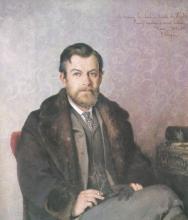 Baron Anatole von Hügel (1854-1928) was a crucial figure in the history of at least three Cambridge institutions. He became the first curator of the University’s Museum of Archaeology and Anthropology in 1883 and worked tirelessly throughout his life to expand its collection and to construct buildings suitable for their display and study. Although educated at Stonyhurst College, Anatole never formally attended university but he was not a mere gifted amateur. He gained his love of natural ethnographic, zoological and botanical subjects from his father and from his own extensive travels, particularly in Australasia and the Pacific. In particular, he made a famous exploration of Fiji where he was found by the British Governor, Sir Arthur Gordon, ‘half starved from trying to live on native food, and having parted with everything down to the buttons on his clothes, in exchange for native earrings and other small ornaments.’ The journals from these travels have been edited and published as The Fiji Journals of Baron Anatole von Hügel.
Baron Anatole von Hügel (1854-1928) was a crucial figure in the history of at least three Cambridge institutions. He became the first curator of the University’s Museum of Archaeology and Anthropology in 1883 and worked tirelessly throughout his life to expand its collection and to construct buildings suitable for their display and study. Although educated at Stonyhurst College, Anatole never formally attended university but he was not a mere gifted amateur. He gained his love of natural ethnographic, zoological and botanical subjects from his father and from his own extensive travels, particularly in Australasia and the Pacific. In particular, he made a famous exploration of Fiji where he was found by the British Governor, Sir Arthur Gordon, ‘half starved from trying to live on native food, and having parted with everything down to the buttons on his clothes, in exchange for native earrings and other small ornaments.’ The journals from these travels have been edited and published as The Fiji Journals of Baron Anatole von Hügel.
On his return to England, the Baron soon settled in Cambridge and so became one of the very few Catholics then resident in Cambridge and the first to hold an official position in the university. He became a member of Trinity and an honorary MA, the first Catholic to take a Cambridge degree since the revolution of 1688. He thus became the central figure in the small world of Cambridge Catholicism and was to remain so until his death. He used all of his worldly connection and his own considerable energy to secure and advance the position of Catholics in Cambridge. In particular, he was instrumental in securing the lifting of the papal prohibition on attendance at Oxford and Cambridge in 1895. He was a member of the delegation to the court of Pope Leo XIII and attended the audience in academic dress, a brave thing to do since technically Catholics were at that time forbidden by the pope from being members of the University. With the eventual support of Cardinal Vaughan and other leading Catholics, the ban was lifted.
The lifting of the ban did not give Catholics carte blanche to attend Oxford and Cambridge. There was still concern as to the moral and religious climate of the universities and Catholic attendance was therefore only permitted given certain conditions. One of these conditions was effectively the establishment of a Catholic chaplaincy. This was briefly based at St Edmund’s House but even though it eventually became independent of St Edmund’s, von Hügel became the first President of the Cambridge University Catholic Association (CUCA) in 1899.
With the Duke of Norfolk and Fr Edmund Nolan, Vice-Rector of St Edmund’s Ware, Von Hügel must be counted as one of the three co-founders of St Edmund’s College. It was he who persuaded the Duke to fund the purchase of Ayerst Hostel and to donate a further £6000 to establish the necessary endowment (von Hügel himself gave £300). Von Hügel remained a close friend of the 15th Duke and eventually succeeded him in 1917 as the second President of St Edmund’s. Von Hügel’s will donated to St Edmund’s the sum of £300 for the foundation of a memorial to the Duke of Norfolk (the Norfolk Library) and the relic of the True Cross which had been given to him by Nolan.
In 1922 he was awarded the Sc,D. honoris causa in recognition of his work as an ethnologist and in 1924 Pope Pius XI created him a Knight of St Gregory in recognition of his efforts in securing the admittance of Catholics into Cambridge. Throughout this time the von Hügel’s residence at Croft Cottage on Barton Road was a centre of Catholic life in Cambridge and it was here that the Baron died on 15th August 1928.


